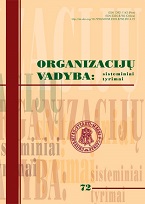Intelektinio kapitalo vystymo gairės organizacijos intelektualizacijos procese
Guidelines for intellectual capital development in the process of organizational intellectualization
Author(s): Gintarė Žilaitytė, Jolita VveinhardtSubject(s): Economy
Published by: Vytauto Didžiojo Universitetas
Keywords: Intelektinis kapitalas; Žmogiškasis kapitalas; Besimokanti organizacija; Intelektuali organizacija Intellectual capital; Human capital; Learning organization; Intellectual organization
Summary/Abstract: Straipsnyje išskiriamos besimokančios ir intelektualios organizacijos charakteristikos intelektinio kapitalo kontekste, numatomos intelektinio kapitalo vystymo gairės besimokančios organizacijos intelektualėjimo procese. Nustatyta, kad besimokančios ir intelektualios organizacijos skiriasi savo tiksline poveikio grupe, todėl keliamas poreikis brėžti individo vystymo veiksmų programos organizavimo, organizacinės atminties plėtros, turimų žinių interpretavimo, inovacinės veiklos įgyvendinimo gaires. Modern organizations, which are being stimulated by external environment and have realized the need for development, strive to become learning organizations, however, the need for innovations motivates to search for new unused possibilities of intellectual capital. It is important for organization chief executive officers to be capable to evaluate perspectives of the organization, to plan strategic actions, evaluating internal organization’s potential and competencies of employees, and enabling them to perform qualitative changes by objective oriented processes. The idea of institutional learning and learning organization has been analysed in management literature for years, however, in 1990 a widely known scientist P. Senge has identified general comprehension and acknowledged classification of five disciplines, which showed the learning organization as a place where people constantly reveal their personal competencies, feel collective inspiration and perform collective work. However, during the period of rapid organizational changes, the organization, if not inclined to learn and accommodate, is obviously self-defeating. Therefore it is important to identify conditions in which organizations become purposefully and efficiently learning and to establish how learning human capital transforms into intellectual capital. Learning and intellectual organizations are linked reciprocally in the context of formation of intellectual capital with common characteristics. Identified characteristics of learning and intellectual organization have obvious links, however, they differ not only by their target impact group, i.e. learning organisation is rather focused on the formation of cross commands, development of learning community, promotion of dialogue, when intellectual organization is rather focused on inter-independence of organization’s members, process of individual development, and emphasis on unique skills and capabilities. Newly-formed organization spontaneously becomes learning and changeable in order to survive in modern global market. Intellectual organization is organization which has passed the phase of learning organization, thereby learning is aimed purposefully to the process of individual development.
Journal: Organizacijų vadyba: sisteminiai tyrimai
- Issue Year: 2014
- Issue No: 72
- Page Range: 113-129
- Page Count: 17
- Language: Lithuanian

